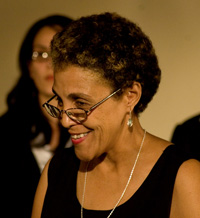12.13.2 Corina Campos

Corina Campos, Cuban choral director. Born in 1956 in Havana, she graduated from the Higher Institute of Arts of Cuba (ISA) (1110 Calle 120 between 9th and 13th, Cubanacán, Playa, Havana), located in Havana, specializing in choral conducting.
She was director of the Cuban National Opera choir, the Symphonic Choir of the Grand Theater of Havana (Paseo Martí No. 458, Old Havana, Havana), and the choral spaces offered by this center, for a period of seventeen years.
She founded her own choral group, which she called the Leo Vocal Chamber Choir, in the 1990s, specifically in 1995. She serves as its director. The name is a tribute to the prominent Cuban musician Leo Brower.
Vocal Leo is the most important work in Corina Campos’s long artistic career and her greatest contribution to Cuban music.
The hallmark that distinguishes Corina’s group within the realm of Cuban choral music is the combination of choreographic and theatrical components in each of the works they perform, and the fact that its twelve members include operatic and lyrical voices.
The repertoire presented by Corina’s group consists of choral works from all periods and diverse musical genres, including polyphonies, operas, and Spanish zarzuelas. It features works by composers such as Ravel, Lecuona, and Monteverde, among others.
Along with Vocal Leo, Campos has performed on stages in various countries and at countless national and international events. At each event, she showcases her meticulous and brilliant work as a choral director, receiving several significant awards in the field of choral music. These include: First Prize in the polyphony and music categories at the 1999 International Competition held in Catalonia; the Cubadisco Award (2001); two gold medals at the 2004 World Choral Music Olympiad in Bremen, Germany; and First Prize in the Mixed Choir category at the 26th Cantonigrós International Music Festival in Catalonia.
In competitions such as the International Choir Festival in Santiago de Cuba, Cuba; the Yucatán Festival and the Guadalajara Festival in Mexico; the International Competition in Catalonia; the International Habaneras and Polyphonies Competition in Torrevieja and the Tolosa Choral Mass Competition, both in Spain; the World Choral Music Olympiad in Bremen, Germany; and the 26th Cantonigrós International Music Festival in Catalonia; Corina has demonstrated the high quality that characterizes her work.
She has experience as a choir director, having participated in important national and international events. She directed and organized the giant choir that participated in the tenor Luciano Pavarotti concert, held at the ruins of Chitchen Itza, Yucatán; she was invited to this role by the Government of Yucatán, Mexico, in 1997. She directed the Barcelona Choral Conference in 1999. She was invited by the Guatemalan Ministry of Culture in 2004 to direct the National Choir for a six-month period. She also taught a diploma in choral conducting at the University of San Carlos in Guatemala.
She is currently a professor of choral conducting at the Guillermo Tomas Conservatory (San Juan Bosco No. 57, Guanabacoa, Havana), located in the Havana municipality of Guanabacoa. She has also taught numerous workshops, lectures, and master classes at prestigious conservatories and universities in countries such as Mexico, Colombia, Argentina, and Germany. Corina Campos is a member of the advisory group for the choral movement in Cuba and for teaching this specialty.








